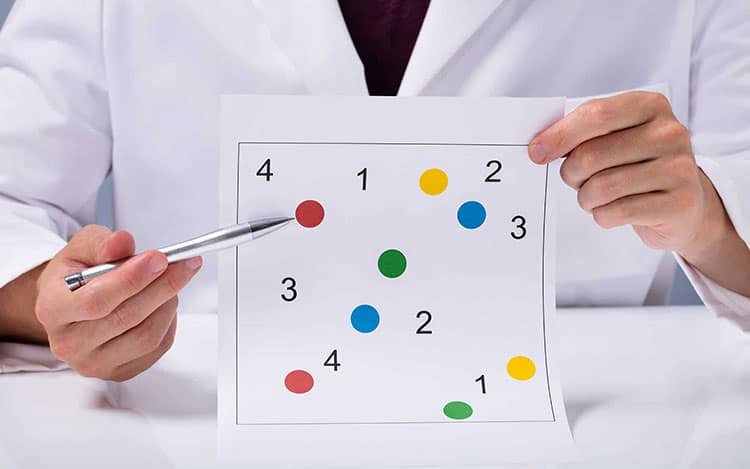Patients who have multiple sclerosis (MS) can access different treatment approaches to decrease their relapse intensity while improving their movement capabilities and controlling their symptoms. MS treatments aims to slow disease advancement as well as control symptoms while offering no cure for the condition.
Every MS case requires individualized treatment planning since the condition impacts symptoms and disease progression differently in each person. Various treatments for MS can be found in the following text.
Disease-modifying therapies (DMTs)
Disease-modifying therapies (DMTs) can reduce the frequency and severity of MS episodes, or relapses. They also can reduce the number and size of lesions (damage to nerve fibers) and reduce symptoms.
The Food and Drug Administration (FDA) has currently approved several drugs for modifying MS. They’re available as:
- Oral treatments
- Intravenous (IV) infusions
- Injectables
Diagnosis
There are no specific tests for MS. The diagnosis is given by a combination of medical history, physical exam, MRIs and spinal tap results. A diagnosis of multiple sclerosis also involves ruling out other conditions that might produce similar symptoms. This is known as a differential diagnosis.
Tests used to diagnose MS may include:
Optical coherence tomography
Which uses light waves to produce images of the eye. In MS, a condition called optic neuritis causes changes in the retina. Optical coherence tomography may be used to measure thickness of the retina. It also may show damage to the retinal nerve fiber.
Lumbar puncture
Also known as a spinal tap, in which a small sample of cerebrospinal fluid is removed from the spinal canal for lab testing. This sample can show changes in antibodies that are linked to MS. A spinal tap also can help rule out infections and other conditions with symptoms similar to MS. An antibody test that looks for kappa free light chains may be faster and less expensive than previous spinal fluid tests for MS.
MRI
Which can reveal areas of MS on the brain and spinal cord. These areas are called lesions. A contrast dye may be given through an IV to highlight lesions that show the disease is in an active phase.
Neuropsychological testing
Neuropsychological testing involves looking at how your brain is working. Testing examines your thinking, memory, language and social skills. It also assesses your personality and mood. A psychologist with specific expertise, known as a neuropsychologist, does this testing. Neuropsychological testing is important in MS because most people with the disease have cognitive impairment. This can include memory loss and trouble with language and thinking skills that affect daily activities. Your healthcare professional may give you a baseline test soon after you are diagnosed. Then you may be retested over time.

Blood tests
Which can help rule out other diseases with symptoms similar to MS. Tests to check for specific biomarkers linked to MS are being developed. These tests may help with diagnosing the disease.
In most people with relapsing-remitting MS, the diagnosis is straightforward. Diagnosis is based on a pattern of symptoms related to MS and confirmed by test results.
Diagnosing MS can be harder in people with unusual symptoms or progressive disease. Additional testing may be needed.
Oral treatments
These treatments are pills taken by mouth:
- Teriflunomide (Aubagio)
- Fingolimod (Gilenya)
- Dimethyl fumarate (Tecfidera and generic equivalent)
- Cladribine (Mavenclad)
- Siponimod (Mayzent)
- Ponesimod (Ponvory)
The following treatments are capsules taken by mouth:
Complementary and natural therapy
Doctors may recommend rehabilitation and other lifestyle behaviors to improve the quality of life with MS.
Diet
While there isn’t any research supporting one specific diet for MS, eating a generally nutrient-rich, balanced diet is recommended.
Exercise
Staying active is critical to addressing MS symptoms and maintaining quality of life. Exercise can help:
- Improve muscle strength
- Increase cardiovascular health
- Improve mood
- Improve cognitive function
A good way to start your MS exercise routine is to try basic stretches while sitting or in bed. When you feel comfortable with those exercises, add more demanding exercises such as:
- Aerobic exercise
- Swimming
- Dancing
- Yoga
- Resistance training
- Walking
A Soothing Yoga Routine

Spending time with people you enjoy can also help improve your mood. Exercising with others might also be a good way to stay social.
Additionally, be sure to talk with a doctor or physical therapist before starting any exercise program.
Treatments for MS attacks
During an MS attack, you may be treated with:
- Corticosteroids. These medicines reduce nerve inflammation. For MS, the corticosteroids used are oral prednisone and intravenous methylprednisolone. Side effects may include insomnia, increased blood pressure, increased blood glucose levels, mood swings and fluid retention.
- Plasma exchange. This treatment involves removing the liquid part of your blood, called plasma, and separating it from your blood cells. The blood cells are then mixed with a protein solution called albumin and put back into your body. Plasma exchange may be used if your symptoms are new, severe and haven’t responded to steroids. Plasma exchange also is known as plasmapheresis.
Oral treatments include:
- Teriflunomide (Aubagio). This once-daily oral medicine can reduce relapses. Teriflunomide can cause liver damage, hair loss and other side effects. This medicine is linked to birth defects when taken by both men and women. Use birth control when taking this medicine and for up to two years afterward. Couples who wish to become pregnant can talk to their healthcare professional about ways to remove the medicine from the body faster. Teriflunomide requires blood testing on a regular basis.
- Dimethyl fumarate (Tecfidera). This twice-daily oral medicine can reduce relapses. Side effects may include flushing, diarrhea, nausea and lowered white blood cell count. Dimethyl fumarate requires blood testing on a regular basis.
- Diroximel fumarate (Vumerity). This twice-daily capsule is similar to dimethyl fumarate but typically causes fewer side effects. It’s approved for the treatment of relapsing forms of MS.
- Monomethyl fumarate (Bafiertam) was approved by the U.S. Food and Drug Administration, also called the FDA, as a delayed release medicine that has a slow and steady action. The time release of the medication may help to decrease side effects. Possible side effects are flushing, liver damage, abdominal pain and infections.
- Fingolimod (Gilenya). This once-daily oral medicine reduces relapse rate. Your heart rate and blood pressure are monitored for six hours after the first dose because your heart rate may be slowed. Fingolimod is harmful to a developing baby. Use birth control when taking this medicine and for at least three days after stopping the medicine. Other side effects include infections that may be rare but serious, headaches, high blood pressure and blurred vision.
- Siponimod (Mayzent). This once-daily oral medicine can reduce relapse rates and help slow progression of MS. It’s also approved for secondary-progressive MS. Possible side effects include viral infections, liver damage and low white blood cell count. Other possible side effects include changes in heart rate, headaches and trouble with vision. Siponimod is harmful to a developing baby. Use birth control when taking this medicine and for at least three days after stopping the medicine. Some people need to have their heart rate and blood pressure monitored for six hours after the first dose. This medicine requires blood testing on a regular basis.
- Ozanimod (Zeposia). This once-daily oral medicine decreases the relapse rate of MS. Possible side effects are elevated blood pressure, infections and liver inflammation. Ozanimod is harmful to a developing baby. Use birth control when taking this medicine and for at least three days after stopping the medicine.
- Ponesimod (Ponvory). This oral medicine is taken once a day with a gradually increasing dosing schedule. The possible side effects are respiratory tract infections, high blood pressure, liver irritation, and changes in heart rate and rhythm. Ponesimod is harmful to a developing baby. Use birth control when taking this medicine and for at least three days after stopping the medicine.
- Cladribine (Mavenclad). This medicine is generally prescribed as a second-line treatment for those with relapsing-remitting MS. It’s also approved for secondary-progressive MS. It is given in two treatment courses, spread over a two-week period, over the course of two years. Side effects include upper respiratory infections, headaches, tumors, serious infections and reduced levels of white blood cells. People who have active long-lasting infections or cancer should not take this medicine. People who are pregnant or breastfeeding also should not take this medicine. Use birth control when taking cladribine and for the following six months. You may need blood tests on a regular basis while taking cladribine.
Treatments for relapses
Ending a relapse as quickly as possible benefits your body and the mind. That’s where relapse treatments come in.
Corticosteroids
Inflammation is a key feature of MS relapses. It can lead to many other symptoms of MS, such as:
- Fatigue
- Weakness
- Pain
Doctors may recommend high dose corticosteroids to ease inflammation and reduce the severity of MS attacks. You typically receive steroid therapy as an infusion in an outpatient center. You may also need to take oral steroids for a time to gradually taper off afterward.
Corticosteroids used to treat MS commonly include methylprednisolone (intravenous) and prednisone.
Read more about steroid therapy for MS flare-ups.
Recent developments or emerging therapies
Bruton’s tyrosine kinase (BTK) inhibitor is a therapy being studied in relapsing-remitting multiple sclerosis and secondary-progressive multiple sclerosis. It works by altering the function of B cells, which are immune cells in the central nervous system.
Another therapy being studied in people with MS is stem cell transplantation. This treatment destroys the immune system of someone with MS and then replaces it with transplanted healthy stem cells. Researchers are still investigating whether this therapy can decrease inflammation in people with MS and help to “reset” the immune system. Possible side effects are fever and infections.
A type of protein called CD40L found in T cells has been shown to play a role in MS. Recent studies have shown that blocking this protein can help manage MS.
A new medicine called a phosphodiesterase inhibitor also is being studied. This medicine works to reduce inflammation by changing damaging immune system responses seen in MS.
Researchers also are learning more about how existing disease-modifying therapies work to lessen relapses and reduce multiple sclerosis-related lesions in the brain. Further studies are needed to determine whether treatment can delay disability caused by the disease.
The bottom line
Coping with MS can present challenges, but treatment can make a big difference in how you feel, both physically and emotionally.
You can work with your doctor to develop a treatment plan that addresses your medical issues and can help improve your physical symptoms and emotional outlook.



